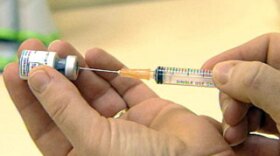A study by Wake Forest Baptist Health has found that between 12-14% of people tested in North Carolina have antibodies for the coronavirus -- meaning they have been exposed to the virus -- with most of them showing little or no symptoms.
The majority of the study participants are in the Triad area.
The findings suggest that COVID-19 is less deadly than originally thought and that the death rate for the disease could be in the range of 0.1%.
But the study also shows that there is significant community spread and that efforts so far to curtail COVID-19 are faltering.
“It’s a double-edged sword,” said John Sanders, the chief of infectious diseases at Wake Forest Baptist. “We are clearly seeing a rapid increase in the number of people that we have antibody evidence who have been infected.”
But he said “the vast majority of these people have very few or no symptoms.”
“We can look at it and say the death rate is lower than we have estimated,” Sanders said. “The severity of symptoms is lower than we estimated and the vast majority of people who were infected are going to do fine.”
The Centers for Disease Control and Prevention says a positive antibody test is presumed to mean that someone has been infected with the novel coronavirus in the past. Antibodies start developing within 1-3 weeks after infection, according to the CDC.
Wake Forest began the study near the start of the pandemic, in early April. The hospital received $100,000 in funding from Republican Senate Leader Phil Berger, who said knowing how many people had been infected could help guide the state’s decisions on how to re-open.
Sanders said the initial results showed few North Carolinians had been exposed to the coronavirus--around 1%.
But in the last two months, he said, the antibody tests show the coronavirus has spread rapidly through the central part of the state.
By mid-May the study showed about 5% of people had been infected with the coronavirus. But by early June – as the state began to reopen – the number of people testing positive for antibodies increased rapidly.
“We would expect it to continue going up at an accelerated rate, or even an exponential rate,” Sanders said.
There are about 10.5 million people in North Carolina. If 14% of the population has been infected with the coronavirus, that would translate into about 1.47 million people.
The state has more than 66,000 confirmed cases as of Wednesday and 1,373 confirmed COVID-19 deaths.
Sanders said the study has enrolled 8,000 people for antibody tests. More than 1,000 of the people involved with the study have been tested multiple times.
Participants in the study receive a test kit in the mail. They prick their finger, collect a blood sample, and then send it in the mail to researchers.
Sanders hopes to continue the study throughout the pandemic.
Wake Forest is expanding the antibody testing to Atrium’s hospitals in Charlotte, as well as hospitals in Wilmington.
Mecklenburg Health Director Gibbie Harris, citing estimates from the CDC, has said that the actual number of infections in the county could be 10 times higher than the number of known infections. That would mean more than 100,000 people in the county have been infected.
Sanders said it's possible that more people have been exposed to COVID-19 in hard-hit counties like Mecklenburg and Wake counties.
There have been similar antibody studies during the pandemic, including a study of pregnant women in New York City hospitals that found that roughly 15% had been exposed to the coronavirus. Most did not have symptoms.
“This study is much bigger. It’s much more stringently designed to represent the population with clear Census tract mapping,” Sanders said. “This data is as large and as significant as any other data that has been released from any other system in the world.”
Click here for the latest coronavirus news on WFAE’s live blog.
Sign up here for The Frequency, WFAE’s daily email newsletter.
What questions do you have about the coronavirus? What has this experience been like for you? Share your questions below._
Copyright 2021 WFAE. To see more, visit WFAE. 9(MDAxNzg0MDExMDEyMTYyMjc1MDE3NGVmMw004))








